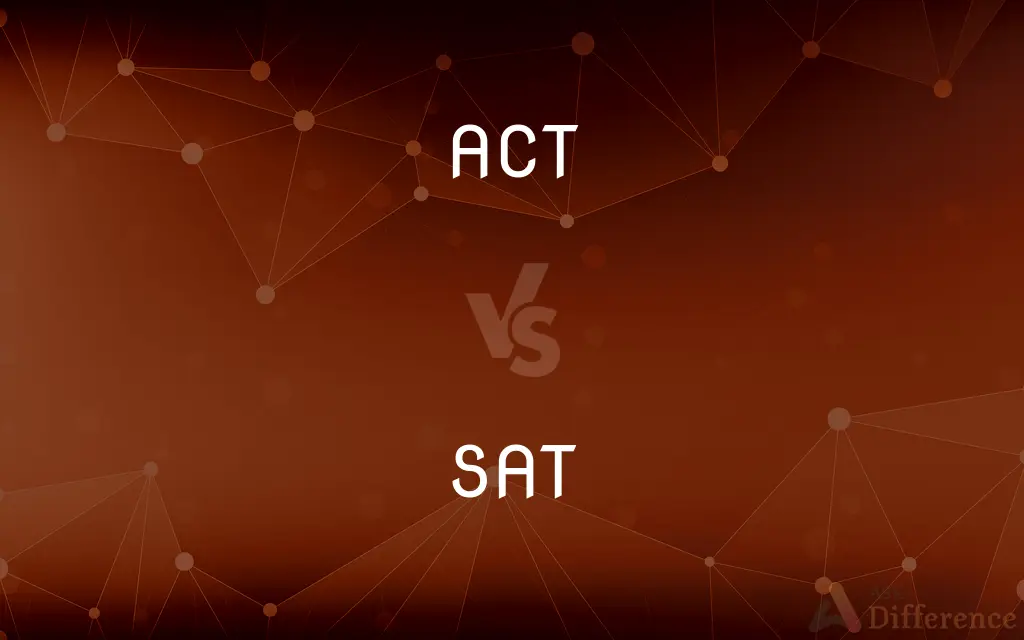ACT vs. SAT — What's the Difference?
Edited by Tayyaba Rehman — By Maham Liaqat — Published on February 23, 2024
ACT focuses on broader content and skills, emphasizing science reasoning, while SAT emphasizes evidence-based reading, writing, and math aptitude without a science section.

Difference Between ACT and SAT
Table of Contents
ADVERTISEMENT
Key Differences
The ACT is designed to assess a student's readiness for college by covering English, mathematics, reading, and science, with an optional writing section. It emphasizes the application of skills across a broader content area. The SAT, on the other hand, evaluates reading, writing and language, and math, with a strong focus on evidence-based reading and writing, and includes an optional essay. This difference highlights the ACT's broader subject coverage versus the SAT's focus on aptitude in reading, writing, and math.
Scoring on the ACT is composite, averaging scores from its four (or five, with writing) sections, each ranging from 1 to 36. The SAT scores range from 400 to 1600, combining evidence-based reading and writing (ERW) and math scores, each ranging from 200 to 800. This difference in scoring systems reflects the distinct ways each test measures student abilities.
The ACT includes a science reasoning section, assessing interpretation, analysis, evaluation, reasoning, and problem-solving skills in the natural sciences, which the SAT lacks. The SAT, however, incorporates science-related questions within its reading and writing sections, focusing more on data interpretation and evidence support without a dedicated science section.
The ACT is generally considered more straightforward in its questions, focusing on assessing students' knowledge and skills directly. The SAT is known for its emphasis on problem-solving and critical thinking skills, often requiring more abstract reasoning and evidence support in its questions.
The timing and pacing of both tests also differ, with the ACT allowing less time per question, which can challenge students who need more time to process information. The SAT provides slightly more time per question, especially in the reading and writing sections, catering to students who excel in critical thinking under less time pressure.
ADVERTISEMENT
Comparison Chart
Content Areas
English, Math, Reading, Science, Optional Writing
Evidence-Based Reading and Writing, Math, Optional Essay
Scoring Scale
1-36 (per section), Composite Score
400-1600 (Total), 200-800 (per section)
Science Section
Yes, a dedicated science reasoning section
No, but includes science questions within other sections
Question Style
Straightforward, assessing knowledge directly
Emphasizes critical thinking and evidence support
Timing
Generally less time per question, faster pace
More time per question, allowing for deeper thought
Compare with Definitions
ACT
A standardized test assessing college readiness, covering English, math, reading, and science.
She improved her ACT score by practicing science reasoning.
SAT
Lacks a dedicated science section but integrates scientific reasoning across sections.
He practiced data interpretation for the SAT's science-related questions.
ACT
The ACT features a composite scoring system, with scores ranging from 1 to 36.
He aimed for a composite ACT score of 30.
SAT
The SAT scores range from 400 to 1600, aiming to reflect a student's readiness for college.
She was thrilled with her SAT score of 1450.
ACT
The ACT offers a science reasoning section, unique among college readiness tests.
The science section on the ACT challenged his analytical skills.
SAT
A college admission test focusing on evidence-based reading, writing, and math.
His SAT preparation focused on evidence-based reading.
ACT
Known for its straightforward question format, focusing on direct assessment of skills.
The ACT's straightforward questions helped her finish on time.
SAT
Includes an optional essay, evaluating analytical and writing skills.
Writing the optional essay for the SAT showcased her analytical abilities.
ACT
Includes an optional writing section, assessing writing and analytical skills.
Adding the writing section to her ACT increased her college application's strength.
SAT
Known for questions that test critical thinking and problem-solving skills.
The SAT's problem-solving questions required him to think critically.
Common Curiosities
What is the main difference between the ACT and SAT?
The ACT includes a science section and covers more content areas, while the SAT focuses on evidence-based reading and writing, and math.
Is the ACT or SAT more difficult?
Difficulty is subjective; the ACT is broader with a science section, while the SAT focuses on critical thinking and evidence support.
Do both tests have an optional writing section?
Yes, both the ACT and SAT offer an optional essay or writing section.
Can colleges prefer one test over the other?
Most colleges in the United States accept scores from both tests without preference.
How are the ACT and SAT scored?
The ACT provides a composite score from 1 to 36, while the SAT scores range from 400 to 1600.
How should I choose between taking the ACT or SAT?
Consider which exam aligns better with your strengths, such as science reasoning for the ACT or critical thinking for the SAT.
How often are the ACT and SAT offered?
Both tests are offered several times a year, typically seven times for the SAT and six to seven times for the ACT.
How long are the ACT and SAT?
The ACT is about 2 hours and 55 minutes (plus 40 minutes for the essay), and the SAT is 3 hours (plus 50 minutes for the essay).
Can I take both the ACT and SAT?
Yes, you can take both tests and submit the higher score to colleges.
What is the best way to prepare for the ACT or SAT?
Practice tests, reviewing content areas, and learning test-taking strategies are effective methods.
Are calculators allowed on both tests?
Yes, both tests allow the use of calculators on specific math sections.
Do both tests have a penalty for guessing?
No, neither test penalizes for wrong answers, so it's beneficial to answer every question.
Can I retake the ACT or SAT if I'm not satisfied with my score?
Yes, you can retake both tests to try to improve your scores.
How do colleges view ACT vs. SAT scores?
Colleges typically view them equally, focusing on the best scores presented by the applicant.
How do I know if my score is good enough for college admission?
Check the admissions criteria of the colleges you're interested in, as score requirements vary.
Share Your Discovery

Previous Comparison
Goblet vs. Wine Glass
Next Comparison
Keratinized Epithelium vs. Nonkeratinized EpitheliumAuthor Spotlight
Written by
Maham LiaqatEdited by
Tayyaba RehmanTayyaba Rehman is a distinguished writer, currently serving as a primary contributor to askdifference.com. As a researcher in semantics and etymology, Tayyaba's passion for the complexity of languages and their distinctions has found a perfect home on the platform. Tayyaba delves into the intricacies of language, distinguishing between commonly confused words and phrases, thereby providing clarity for readers worldwide.
















































